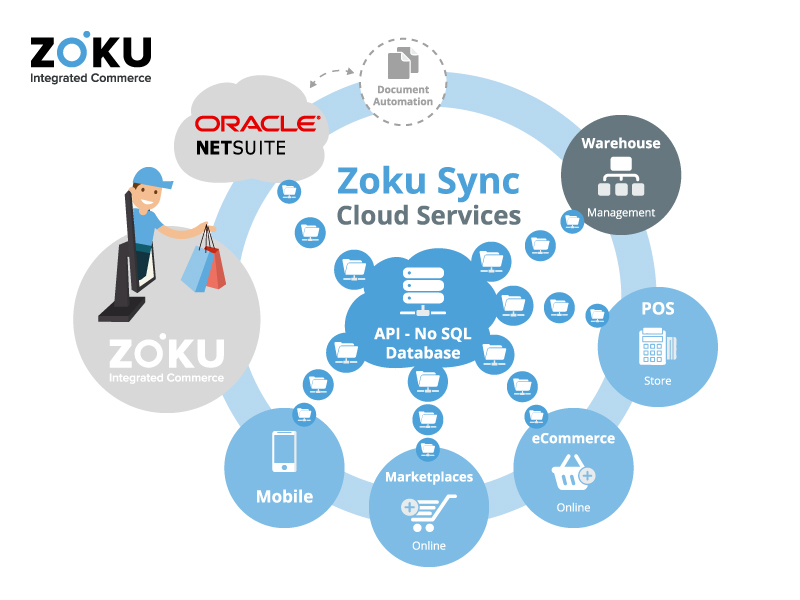Many software vendors claim that they are leaders in omnichannel commerce. They highlight well-known brands as their references. While those brands may indeed be happy customers of the vendor, most likely they are using just one sales channel or functional system from the vendor.
Let’s start “from the back.” Financials, Inventory Management, Procurement, CRM and Logistics operations can be all managed in a single ERP system. Oracle NetSuite, Microsoft Dynamics and SAP Hana are the leaders, with some niche players such as Salesforce coming in strong from a CRM and Sales Automation perspective. Then we have world class eCommerce platforms such as Adobe Magento, Shopify and BigCommerce dominating that space and offering powerful solutions for any budget. At the same time, we have global marketplaces such as Amazon and eBay and local ones in various territories. Speaking of sales channels, we can’t forget the physical stores, where we have the traditional POS vendors like Micros, NCR, Toshiba and new generation vendors such as Lightspeed, Clover and Revel. Last but not least, Warehouse Management Systems are key to the operations of retail or F&B businesses and we see a number of well-established players there.
All of these vendors have been, and some continue to be, leaders in their own domains with thousands of happy customers. However, there is no single vendor who can deliver all the functional solutions mentioned above in a single system. Understandably so, because it would take hundreds or thousands of hours of R&D and domain expertise to create each of these systems. Suppose, for example, Adobe Magento decides to build its own cloud ERP system to compete with NetSuite. Not only it would take years to achieve this, but the company would lose focus in the core business where it currently excels.
Zoku has taken a different approach to offer omnichannel. By choosing Oracle NetSuite as the backend system, given its widespread recognition as the leader in this space, Zoku can bring a collection of the best Financial, Inventory & Order Management, Procurement and Manufacturing modules as its backend. Zoku’s cloud APIs allow NetSuite to integrate with leading eCommerce vendors, giving its customers the freedom to choose their eCommerce platform based on their budget, technical expertise and any other requirements. Similarly, Zoku has integrations with many global and regional marketplaces, and also allows integration with local marketplaces via its Commerce API.

When it comes to POS and Warehouse & Inventory Management, Zoku developed its own state of the art solutions. The key here is that, unlike point to point integrations between ERP and eCommerce, ERP and POS, ERP and Warehouse Management System, and so on and so forth, Zoku brings everything together. It integrates everything via its cloud API services in a single, omnichannel system powered by the world’s leading cloud ERP, allowing businesses to choose their own eCommerce (web store and marketplaces) solutions, all integrated. Zoku’s simple to use Warehouse & Inventory Management multiplatform app runs on any device from mobile phones, Warehouse PDAs or PCs, enabling warehouse and store personnel to perform daily tasks such as receiving, fulfilling, counting, transferring, label printing and one-step assembly.
Zoku’s solution can be considered a true omnichannel solution in the sense that it:
- is powered by NetSuite, the leading Cloud ERP System
- gives the enterprise the ability to choose the most suitable eCommerce platform for its budget and needs
- brings its own state-of-the art Point Of Sale and Warehouse & Inventory Management applications
- offers cloud based APIs that allow integration with any internal and external service such as Delivery, Logistics, Payment, etc.
So the next time a vendor makes a rosy claim about being an omnichannel vendor to leading brands, ask the tough questions and drill down to the reality of what they are really providing and what they are not. If you perform some due diligence, you will understand the logic of Zoku’s approach and consider it as a solution that gives you the optimal combination of robust functionality and freedom of choice.


